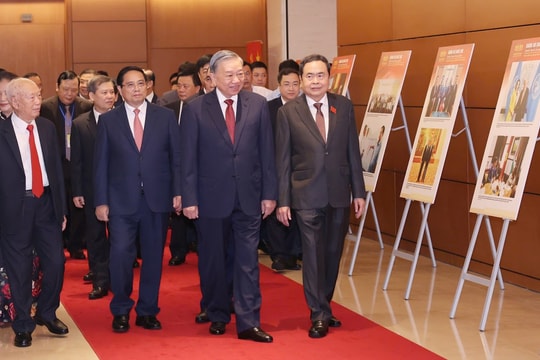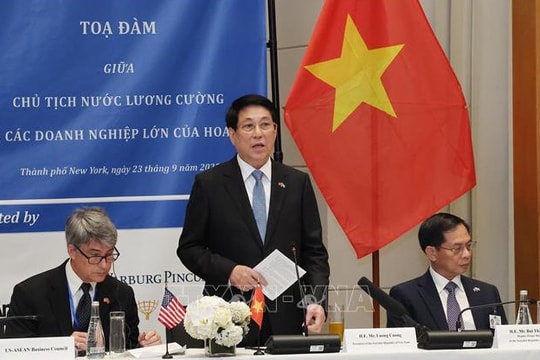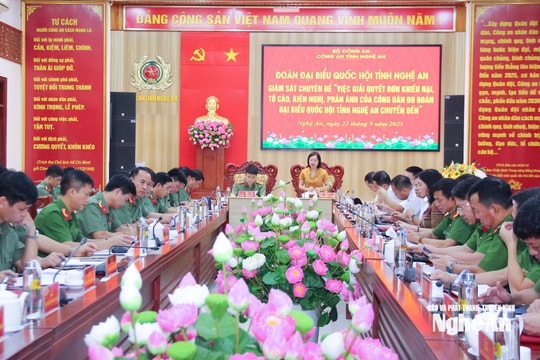Delegates of Nghe An Delegation proposed more specific regulations on dispute resolution methods between consumers and business organizations and individuals.
(Baonghean.vn) - On the morning of May 26, continuing the 5th session, under the chairmanship of National Assembly Chairman Vuong Dinh Hue, the National Assembly held a plenary session at the Hall, discussing a number of contents with different opinions of the draft Law on Consumer Rights Protection (amended).
 |
Panorama of the working session on the morning of May 26 at Dien Hong Hall, National Assembly House. Photo: Quang Khanh |
Speaking at the discussion on the draft Law on Consumer Rights Protection (amended), delegate Tran Nhat Minh, Nghe An delegation, commented on two contents related to dispute resolution between consumers and business organizations and individuals.
Citing the report of the Ministry of Industry and Trade summarizing the implementation of the Law on Consumer Protection on receiving and resolving requests and complaints of consumers, it pointed out that the reason why Arbitration and Court methods are not chosen by many consumers is due to complicated procedures, long time to resolve cases, high costs, while the value of cases violating consumer rights is low (according to the data of the Report, the number of cases related to consumer rights resolved by Commercial Arbitration and Court is zero); according to delegate Tran Nhat Minh, another reason leading to the above situation is that the provisions of Article 30 of the current law on dispute resolution methods are still general and not specific.
Because the Law on Consumer Rights Protection 2010 only states the methods of dispute resolution but does not clearly stipulate the resolution mechanism of the parties when a dispute occurs, specifically, the parties can only choose 1 of 4 resolution methods or choose all 4 methods (Negotiation; Mediation; Arbitration; Court).
 |
Delegate Tran Nhat Minh, Nghe An delegation, speaks at the discussion on the draft Law on Consumer Rights Protection (amended). Photo: Quang Khanh |
“With this provision, if we understand that the disputing parties can choose all four methods, it is contrary to the provisions of Article 6 of the Law on Commercial Arbitration 2010 (Article 6 of the Law on Commercial Arbitration stipulates: "In case the disputing parties have an arbitration agreement but one party files a lawsuit at the Court, the Court must refuse to accept the case, except in cases where the arbitration agreement is invalid or the arbitration agreement cannot be performed"), that is, the parties can only choose one of two agencies: Arbitration or Court to resolve the dispute when it occurs", delegate Tran Nhat Minh analyzed.
Pointing out the shortcomings of the current Law, the delegate of Nghe An Delegation suggested that the drafting agency study and amend Clause 1, Article 54 related to the method of resolving disputes between consumers and business organizations and individuals in the draft Law on Consumer Rights Protection (amended) in a more specific, easy-to-understand and easy-to-apply direction. Specifically, the delegate suggested: "When a dispute occurs, consumers and business organizations and individuals can resolve it themselves through the following methods: negotiation and conciliation. In case they cannot resolve it themselves through negotiation and conciliation; or do not want to choose to resolve it by negotiation and conciliation, they can choose one of two methods of resolution: Arbitration or Court".
On the other hand, the delegate of Nghe An Delegation also requested the drafting agency to study, amend and supplement the provision "Consumers have the right to choose Arbitration or Court to resolve disputes according to the provisions of the Law on Commercial Arbitration" in the draft Law on Consumer Rights Protection (amended) to be compatible with the Law on Commercial Arbitration in terms of consumer rights protection.
Because Article 17 of the 2010 Commercial Arbitration Law stipulates: "Consumers' right to choose dispute resolution methods: For disputes between suppliers of goods and services and consumers, although the arbitration clause has been recorded in the general conditions of goods and services provision prepared by the supplier in the arbitration agreement, consumers still have the right to choose Arbitration or Court to resolve the dispute. Suppliers of goods and services only have the right to file a lawsuit at Arbitration if approved by the consumer".
 |
| National Assembly delegates from Nghe An delegation exchanged on the sidelines on the morning of May 26 at Dien Hong Hall, National Assembly House. Photo: Phan Hau |
Regarding the implementation of negotiation and conciliation results, delegate Tran Nhat Minh said that the draft Law on Consumer Rights Protection (amended) still lacks provisions on resolving legal consequences when one of the parties fails to implement the negotiation and conciliation results.
To overcome the situation where "the results of negotiation and conciliation are often not seriously implemented by the parties because the legal value of the successful conciliation minutes is not high" as stated in Report No. 155 of the Ministry of Industry and Trade summarizing the implementation of the Law on Consumer Protection, delegates proposed to add a provision: Within 60 days, if one party does not implement the results of negotiation and conciliation, the other party has the right to request Arbitration or the Court to resolve the matter according to the provisions of law.
On the other hand, Clause 1, Article 60 of the draft Law stipulates that "The results of negotiations between business organizations and individuals with consumers must be made in writing or in forms of equivalent legal value". According to delegates, the provision of "form of equivalent legal value" is still general, difficult to understand, and difficult to implement.
Meanwhile, according to the provisions of Article 119 of the Civil Code, the form of civil transactions is expressed in words, in writing or by specific acts. Civil transactions through electronic means in the form of data messages according to the provisions of the law on electronic transactions are considered written transactions. At the same time, according to the provisions of Article 116 of this Code, the result of negotiation is a type of civil transaction. Therefore, the delegate proposed that the draft Law refer to forms with the same value as documents according to Article 119 of the Civil Code accordingly. However, to ensure the legal value of the results of negotiation, it is necessary to stipulate that the results of negotiation must be made in writing.
Also in the working program, the National Assembly heard the Report and examination report on the draft Resolution of the National Assembly on piloting a number of specific mechanisms and policies for the development of Ho Chi Minh City.







.jpg)
